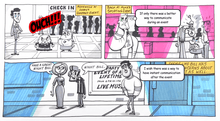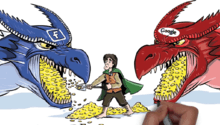Whiteboard animation


Whiteboard animation is a process where a creative story and storyboard with pictures is drawn on a whiteboard (or something that resembles a whiteboard) by artists who record themselves in the process of their artwork. It is used in TV and internet advertising to communicate messages in a unique way.
Terminology
The term whiteboard animation comes from the process of someone drawing on a whiteboard and recording it. The actual effect is a time-lapse, or sometimes stop-motion. Actual animation is rarely used but has been incorporated. Other terms are video scribing, and animated doodling. These video animation styles are now seen in many variations, and have taken a turn into many other animation styles. With the introduction of software to create the whiteboard animations, the process has many different manifestations of varying quality.
Whiteboard animation in media
Whiteboard animation videos are seen mostly throughout the internet on YouTube and Vimeo.
The style has been used a few times in TV spots. The first, though very different from the current style, were the UPS Whiteboard Commercials. Many companies and firms of all sectors and sizes are incorporating this style into their modus operandi.
For educational purposes, whiteboard animation videos have been used to learn languages, teach company employees different company policies, demonstrate a new software or product to consumers, or are used as chapter summaries for educational textbooks. Starting in 2010, the Royal Society of Arts converted selected speeches and books from its public events programme into whiteboard animations. The first 14 RSA Animate videos gained 46 million views in 2011, making the RSA's YouTube channel the no.1 nonprofit channel worldwide.[1]
References
- ↑ Halliday, Josh (21 October 2011), "Internet users get animated about RSA short film series", The Guardian.